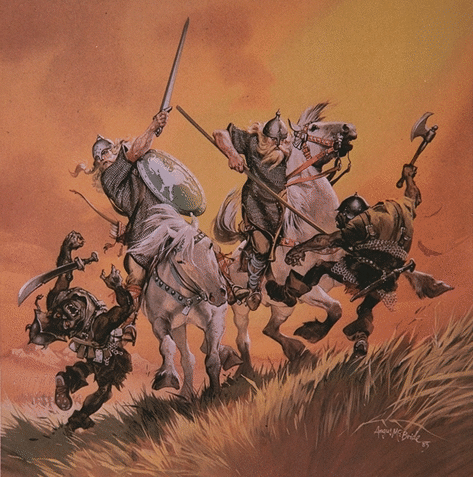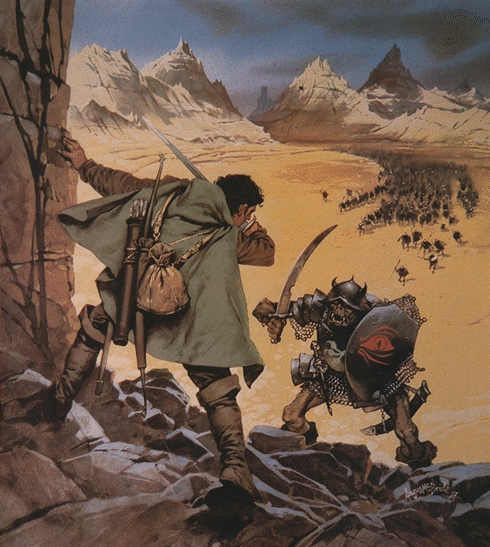I’ve been in a big-time Star Trek mood lately. I’ve discovered that an episode of Deep Space 9 is the perfect length to watch while feeding The Littlest Gamer at 4am in the morning, and thus have been progressing quickly through the series—I’m partway through season 4, and have recently upgraded my rating of the show from Not Bad to Pretty Awesome.
To complement my DS9 viewing, I’ve also been catching up on The Jefferies Tube podcast, which I neglected (along with all my other blog reading and podcast listening) during the Birth of The Littlest Gamer and the Flood of Family that followed. One of the recent podcast episodes focused on Star Trek RPGs, and I can’t resist adding some of my own thoughts.
I’ve owned each of the three Star Trek RPGs discussed in the podcast. (Well, almost: I owned FASA Trek and Decipher Trek, but the version of Prime Directive I owned was the first edition, not the (much better, going by the podcast’s description) GURPS version.) While I was not overly fond of Prime Directive, I like both the FASA and Decipher games—although I’ve played them a grand total of twice and once, respectively.
I like Star Trek. But despite enjoying the setting and finding the games themselves fairly interesting, I have never felt a strong desire to roleplay in the Star Trek universe. Judging by the fact that almost none of the numerous game publishers to acquire the Star Trek license has managed to keep the game alive for more than a few years, I suspect I’m not the only one who finds Trek a difficult gaming prospect. Why is this?
The podcast points out some of the big reasons that Trek is a tough setting to game in—it’s a setting where your character’s rank in Starfleet (or the equivalent alien organization) leads to the same difficulties that military-based games run into: somebody’s character is going to end up being the captain, and somebody else is going to have to play the ship’s counselor (or another sideline role). One of those is significantly more appealing to most gamers than the other. And the podcast notes that the massive amount of Star Trek canon material makes it hard for even the nerdiest gamemaster to run a game that can’t be sabotaged by a particularly knowledgeable Trekkie.
For me, the big problem is the very strict narrative structure that defines the Star Trek stories we love to watch on TV. In a typical Star Trek episode, the demands of the storyline define everything else about the show—the technology available to the characters, the outcomes of battles, who gets killed and who doesn’t, even the means by which the heroes eventually win in the end—it’s all tightly scripted to make sure the story works out in time (and usually with a nice moral lesson to boot). The high level of technology involved makes this especially important: in a Star Trek game, if Romulan Guard A gets lucky with a phaser shot in battle, a hero dies and the story comes to a screeching halt. In the TV show, by contrast, nobody dies unless it’s integral to the storyline. The heroes in a Star Trek TV episode often have their normal tools and skill rendered useless by narrative fiat (something that would infuriate most RPG players) to prepare the way for a clever technobabble solution at the very end, in just the nick of time. (And how to simulate that staple of Star Trek, the last-minute “I could try rerouting power through the polarized chronoton pulsator, which might give us just enough energy to return us to our own dimension!” solution?) That all makes for fun stories, but it’s hard to model in an RPG game, where players expect more freedom of activity and dislike any hint that the the gamemaster is manipulating everything to force them along a particular narrative channel.
I imagine this problem is not a complete game-killer, as plenty of people enjoy gaming in the Star Trek universe. But it bugs me enough that I’ve never tried to run a full Star Trek RPG campaign. I suspect that this might be the sort of situation that could be handled by certain indie roleplaying games that grant extra narrative power to the players and which are more like mutual storytelling sessions than traditional roleplaying games. But I’m an old-school dungeon-crawl gamer, and on top of that, I don’t think my wife would really want me heading off down yet another money-draining branch of this hobby.
So maybe Star Trek gaming just isn’t for me… although you can be sure that won’t stop me from plunking down my hard-earned cash for the next gorgeously-illustrated Star Trek roleplaying game that comes along. I love this hobby….




 by
by 



 Many, many people have in the last few days written eloquent tributes to
Many, many people have in the last few days written eloquent tributes to  Tonight we participated in what some are calling “GaryCon”—a game of dungeon-crawling, kobold-killing, treasure-looting D&D in memory of Gary. I ran the players through a mostly improvised dungeon populated by skeletons, giant rats, and an owlbear, and remembering Gary’s DMG advice not to coddle players, I even managed to kill one of them with said owlbear. It was not the best game I’ve ever run, nor was it the worst: it was just a good game, and that seemed perfectly appropriate.
Tonight we participated in what some are calling “GaryCon”—a game of dungeon-crawling, kobold-killing, treasure-looting D&D in memory of Gary. I ran the players through a mostly improvised dungeon populated by skeletons, giant rats, and an owlbear, and remembering Gary’s DMG advice not to coddle players, I even managed to kill one of them with said owlbear. It was not the best game I’ve ever run, nor was it the worst: it was just a good game, and that seemed perfectly appropriate.

